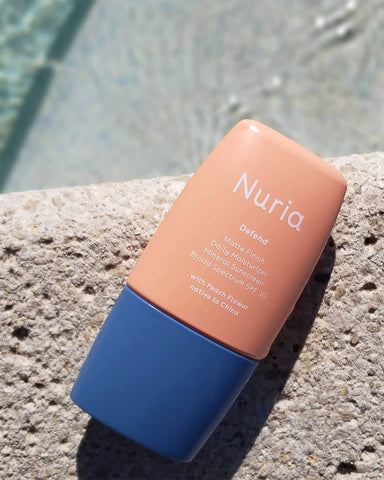
Mineral vs. Chemical Sunscreens
We all know that we should wear sunscreen every day, but how do you know which sunscreen to choose? There has been a lot of buzz about chemical versus mineral sunscreens, and it can get confusing to pick the right sunscreen that looks and feels good and is also healthy for your skin and the environment. We are going to demystify the differences between chemical and mineral sunscreens so that you can pick the best sunscreen for you!
What is in chemical sunscreens?
Chemical sunscreens protect by absorbing into the skin and then once in the skin, they absorb ultraviolet (UV) energy from sun exposure. Some of the common active ingredients found in chemical sunscreens are avobenzone, oxybenzone, octocrylene, homosalate, octisalate, and octinoxate. FDA studies in 2019 and 2020 showed that six of the most common active ingredients in chemical sunscreens were found in the bloodstream after product containing these ingredients was used on the skin. While the presence of these sunscreen ingredients in the bloodstream does not necessarily indicate a significant health risk, consumers are understandably uneasy about using products containing these ingredients.
Another challenge with active ingredients in chemical sunscreens is the environmental impact of these ingredients. In laboratory testing, oxybenzone has been found to be a contributor to coral reef bleaching – coral reef bleaching occurs when coral expels the algae that help keep the coral healthy! Other UV filters like octocrylene and octinoxate have been found in some species of fish worldwide, potentially impacting the food chain and harming our ocean friends.
But here is the catch! Many chemical sunscreens feel beautiful on the skin and are light and transparent. So what are your choices if you don’t want to risk health effects and you want to be kind to our ocean friends? Luckily, there is an alternative to chemical sunscreens: mineral sunscreens.
The benefits of mineral sunscreens
Mineral sunscreens are the alternative to chemical sunscreens, and they protect the skin by sitting on the surface of the skin and blocking and reflecting UV light. The FDA recognizes that the main ingredients in mineral sunscreen, zinc oxide and titanium dioxide, are safe. Because zinc oxide and titanium dioxide sit on the surface of the skin, mineral sunscreens are far less likely to irritate sensitive skin and are generally safe for people with sensitive skin and eczema.
The combination of zinc oxide and titanium dioxide gives you all of the sun protection that you need – zinc oxide provides broad spectrum sun protection (protection from UVA and UVB rays) and helps prevent skin cancer and early aging, and titanium dioxide helps protect skin by blocking UV light that can cause sunburn and is also linked to skin cancer. And our ocean friends love mineral sunscreens too because they are safe for coral reefs and fish!
Keeping it clean
When choosing a mineral sunscreen, you have to look at the entire ingredient list. Since other ingredients in a mineral sunscreen can cause irritation, it is important to find a mineral sunscreen that is also free of potential irritants. With advances in ingredient and formulation technology, it is possible to find a mineral sunscreen formula that is clean, weightless, and protective without feeling greasy and without leaving a white cast. Nuria’s Defend Matte Finish Daily Moisturizer with Broad Spectrum SPF 30 provides all-mineral sun protection without compromise – this clean, beautiful formula works on all skin tones, forming a transparent barrier to shield and protect from harmful aggressors like UVA/UVB rays & pollution and keep your skin glowing.
Remember, the most effective sunscreen is the one you use every day, so consider applying your sunscreen as the most important step in your beauty routine!
About the author, Jasmin Figueroa
Jasmin is an accomplished formulation scientist and skin health expert who has spent her career listening to consumers and developing products that rock. A founding member of the Nuria community, she loves traveling with her family, chilling with her friends at the beach, and will totally judge you if you don’t wear SPF.

